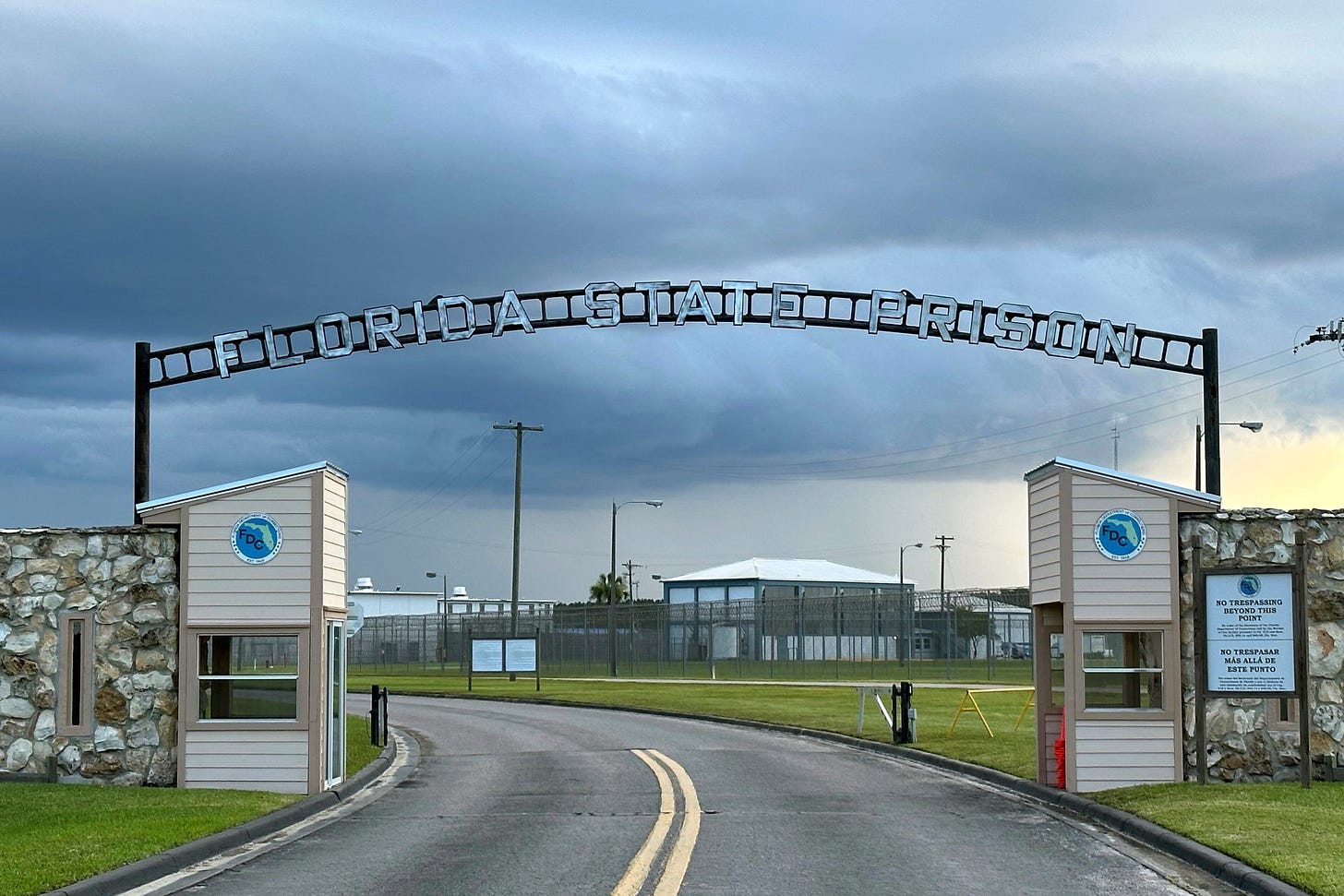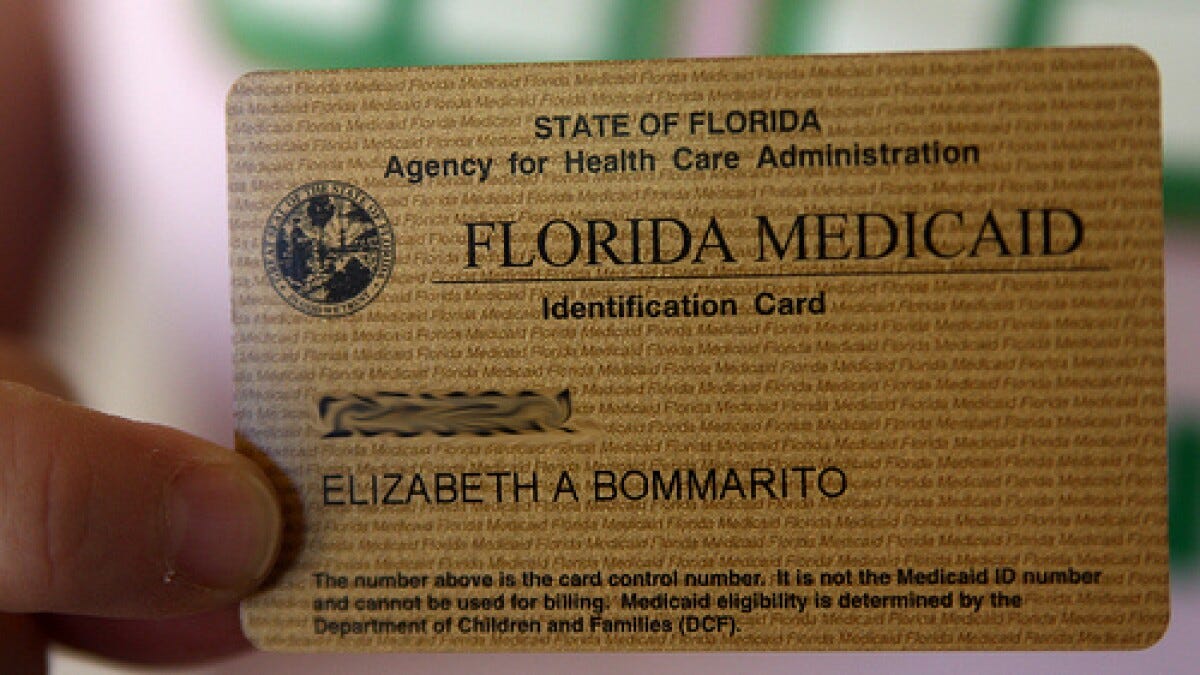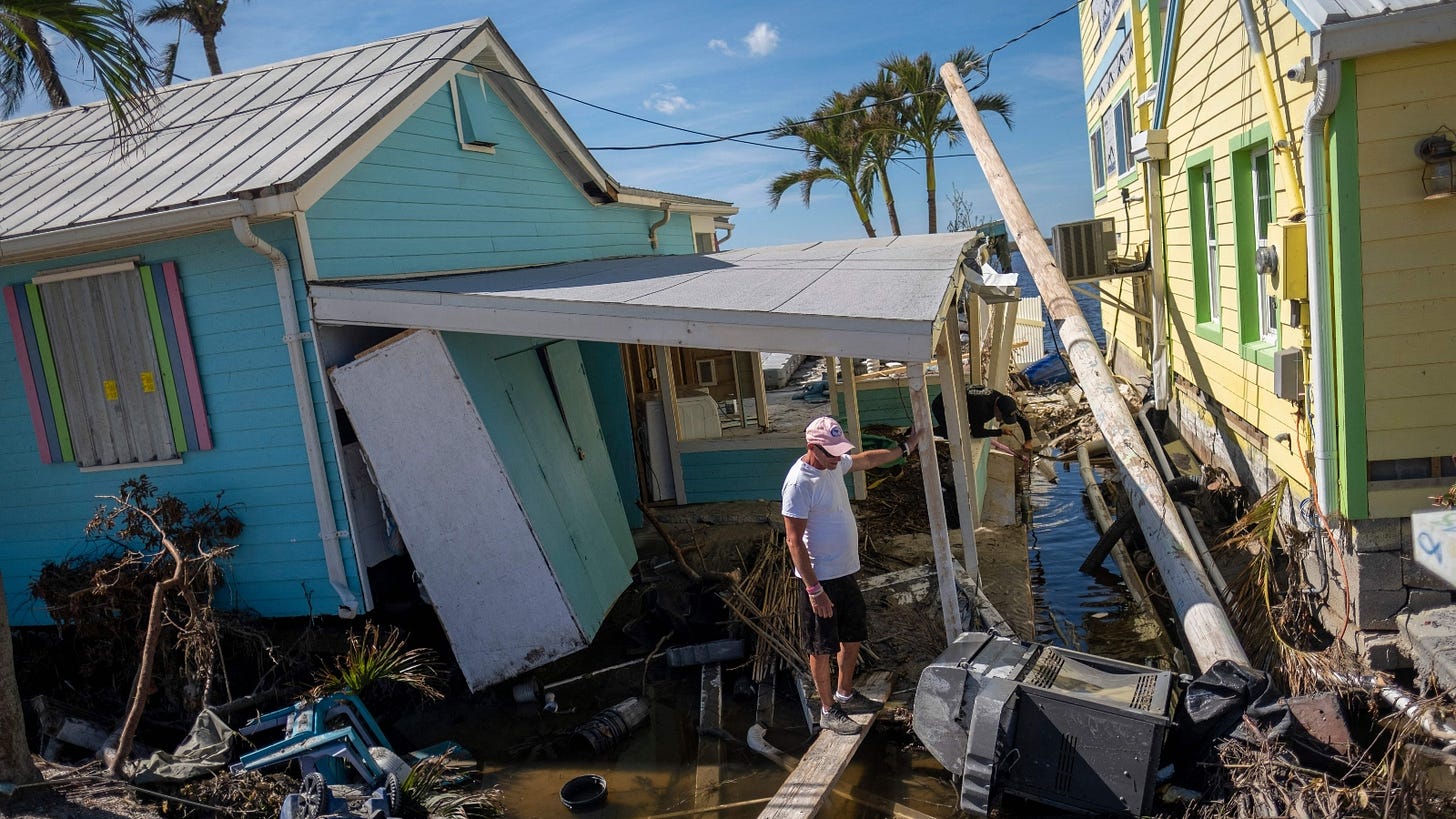Florida's prison system in crisis & record tourism numbers
December 1, 2023 — This Week's Top Stories in Florida
Welcome to this week’s edition of Floridian Today, a newsletter about all things Florida — from politics, business, real estate, and climate. Reporting from the Sunshine State, these are the most important stories you need to know. To never miss an update, subscribe here:
Here’s the latest from Florida…
Florida prison system in crisis and needs immediate attention, per report
The state prison system requires an investment of at least $2.2 billion for urgent repairs, retrofits, and staffing, according to a report by consulting firm KPMG. The assessment, which developed a 20-year “master plan” for the state, details that one-third of correctional facilities are in critical or poor condition with crumbling infrastructure that includes leaking roofs, broken windows, and corroded doors, among other problems. The study highlights a critical need for funding due to aging infrastructure, projected inmate increases, and ongoing staffing issues that result in “security and safety risks.” Despite salary increases granted by lawmakers in recent years for correctional officers, the Department of Corrections (DOC) possesses a turnover rate above 26% and staff vacancies over 20%. Persistent hiring and retention troubles for DOC’s 14,000 employees caused Gov. DeSantis to activate the Florida National Guard to staff facilities beginning in September 2022, in which about 300 are still assigned to work at prisons. The report suggests three options for stabilization, with plans ranging from $2.2 billion to $11.9 billion in costs. The most expensive $11.9 billion option includes the construction of three 4,800-bed prisons and two hospitals over the next 20 years, closing four prisons that require extensive maintenance, and reopening 8,000 beds in 16 prisons over four years, and another 4,640 beds to 18 prisons by 2030. The least expensive $2.2 billion plan recommends repairing electrical, plumbing, and security systems at existing prison facilities, and constructing a 4,800-bed prison and two new hospitals while adding beds at current sites. This plan also includes $582 million to add air conditioning at prison sites after the issue gained scrutiny this past summer as it was revealed more than 500 prison housing units do not have AC. The Senate Criminal and Civil Justice Appropriations Committee, led by Chairwoman Jennifer Bradley (R-Fleming Island), will discuss funding in the upcoming legislative session to address the long-standing challenges in the state's prison system.
Florida sets new tourism record
The Sunshine State has achieved a new visitation record in the third quarter of 2023, with an estimated 35.1 million visitors, as announced by Gov. DeSantis. The figure comprises 32.2 million domestic visitors, 2.2 million international tourists, and 666,000 Canadian visitors. The number of overseas visitors to Florida is trending upward. The state continues to surpass overall annual visitation records, welcoming 105.2 million total tourists so far in 2023, outpacing the first nine months of 2022 by 724,000 visitors. This figure is also 8% higher than pre-pandemic numbers in 2019. DeSantis attributes the record success to the state's commitment to freedom for travelers without “arbitrary government restrictions.” The visitation surge has also contributed to an 11.3% increase in travel spending compared to Q3 2019.
Legislators move to deregulate schools by eliminating testing and changing recess
Florida lawmakers are advancing bills aimed at reducing regulations on public schools. The Senate Education Pre-K-12 Committee has unanimously approved three bills ahead of the 2024 legislative session that would make changes to testing requirements, recess rules, and teacher pay. The most controversial measure would eliminate the requirement that high school students pass the state’s English-language arts exam in 10th grade and the Algebra I end-of-course assessment to receive diplomas. The bill as proposed would introduce a "good cause exemption" for third-grade students who do not receive satisfactory scores on the required English-language arts exam to advance to fourth grade. The exemption gives parents the sole authority to determine whether their child is retained in the third grade or moves on to the fourth grade. Another bill gives school districts more flexibility in scheduling the mandated 100 minutes of weekly recess. Currently, elementary schools must provide students with 20 minutes of recess each day. The bill would allow districts to break up recess time into shorter periods throughout the day. Several school superintendents have voiced support for the bills, while others such as the education advocacy group, The Foundation for Florida’s Future, have raised concerns that some of the changes could weaken the public education system. The deregulation measures aim to cut bureaucratic mandates and provide greater competition after lawmakers passed universal school choice legislation last year.
California Exodus: More residents flock to Florida, less to Texas
The allure of Florida is growing as residents of other states seek new horizons, including a growing number of Californians making the move across the country to the Sunshine State. Recent state-to-state migration figures reveal a notable shift in relocation patterns, with fewer California residents opting for Texas and an increasing number finding solace in Arizona and Florida. While Texas experienced a decline in the influx of former Californians, dropping from over 107,000 in 2021 to 102,000 in 2022, both Arizona and Florida saw a surge. Florida witnessed a rise from over 37,000 to more than 50,000 residents during the same period. Housing costs emerge as the driving force behind California's net loss of over 113,000 residents last year, with a disproportionate impact on younger and immigrant families that seek areas with lower housing expenses. More than 343,000 former California residents left for another state last year – the most of any state. The trend reflects a broader national shift, with more than 8.2 million U.S. residents relocating between states in 2022, spurred by factors including housing affordability and pandemic-induced changes in lifestyle. The second-largest state-to-state migration in the U.S. was from New York to Florida.
Medicaid enrollment continues to decline as Floridians lose eligibility
Florida's Medicaid enrollment has sharply decreased by over 670,000 individuals after the expiration of the federal public health emergency in April that was enacted during the COVID-19 pandemic. The state Agency for Health Care Administration reported a current enrollment of 5,105,874, down from its high of 5,778,536 earlier this year. Medicaid is funded by both the state and federal government, but Congress gave states extra funding for the program throughout the global health crisis in 2020 as long as they agreed not to remove any Medicaid beneficiaries from the rolls. This included many people who be otherwise ineligible for Medicaid due to exceeding the maximum income qualifications remaining enrolled in the program. However, as the public health emergency came to an end earlier this year, Florida officials implemented an eligibility "redetermination" process that examines the earned income of beneficiaries to determine Medicaid qualification. This has resulted in the total number of enrollees across the state to drop. With the redetermination process ongoing, a potential class-action lawsuit is challenging the state's handling of Medicaid beneficiaries, with a federal judge set to hear arguments on December 5. Critics argue inadequate notice and information have been provided to program enrollees, arguing a violation of their due process rights. The lawsuit seeks to have Medicaid officials reinstate coverage to those dropped from the program and cease further terminations until adequate information is provided.
Hurricane Ian renews push for stricter building codes, increased resiliency
Following Hurricane Ian in September 2022, a paradigm shift is underway in Florida's real estate landscape, as officials gear up for tougher building codes and increased resiliency measures. Similar to the aftermath of Hurricane Andrew in 1992, which prompted the consolidation of statewide building codes, Ian's impact has highlighted the need for updated regulations. A recent analysis revealed that structures built before 1996 experienced twice the wind losses in Lee County compared to those built afterward.The Federal Emergency Management Agency's (FEMA) 50-50 rule is also shaping the post-hurricane scenario, requiring homes with substantial damage to adhere to current building codes and floodplain regulations. This costly rule is driving some homeowners to sell, others to completely demolish and rebuild their homes, or walk away from their properties entirely, particularly in hard-hit communities like Fort Myers Beach. Anticipated regulatory changes include replacing wood-framed structures with concrete blocks, updates to FEMA's flood elevation maps, adjustments to height limits for more high-rises, and increased density for affordable housing. For buyers and sellers, these changes present unique opportunities and challenges, with many longstanding properties hitting the market for the first time in decades, and for some, at a discount.
DeSantis allocates $57M to protect natural springs
Gov. DeSantis has set aside over $57 million for 23 springs restoration projects aimed at protecting Florida's iconic natural springs, enhancing flow, and improving water quality. These projects, identified by the Florida Department of Environmental Protection (FDEP) and water management districts, include wastewater and stormwater initiatives, pollution control projects, and water-quality improvements. The investments also involve land conservation in spring recharge zones to protect groundwater from being contaminated with nutrients. DeSantis emphasized the importance of preserving Florida's more than 1,000 springs for future generations, stating that the $57 million investment would maintain water quality, ensuring the springs remain a world-renowned tourist destination that boosts the state economy.
Lawmakers want to lower Communications Services Tax
Floridians pay the 12th highest taxes in the nation on cell, landline, cable, and satellite television as well as video and music streaming services via the state’s Communication Services Tax (CST). Lawmakers are raising concerns about the high tax rates, which is elevated due to local CST rates charged to customers. During a recent House Ways & Means Committee workshop, House members questioned the high local CST rates and expressed unease about how local CST revenue is spent. Last session, lawmakers initiated a three-year moratorium on local CST rate increases. With nearly 500 local governments in Florida imposing a Communications Services Tax, discussions are underway on further reducing this tax burden for residents, spanning as high as 7.7% on top of the state rate of 7.44%. Last year saw a proposed 1.44% reduction to the CST rate, which was eventually nixed but could have saved Floridians $168.75 million, according to staff analysis.
Broward County approves new $322M government center
In a decisive 7-1 vote, Broward County commissioners have given the green light for the construction of a state-of-the-art government center in Fort Lauderdale. The $322 million project, set to replace the outdated Robert Hayes Gore State Office Building, will be located at 201 West Broward Boulevard. Encompassing 387,000 square feet and soaring 20 stories high, the new center will boast 1,500 parking spaces over 10 stories. Broward County Mayor Lamar Fisher expressed confidence in the project, highlighting the strategic acquisition of the 4.4-acre site in June and its potential for future monetization. Dissenting Commissioner Michael Udine emphasized concerns about the building's footprint and urged fiscal responsibility in the taxpayers' interest. County Administrator Monica Cepero assured that funding would be offset by taxes, ground leases, and potential future site monetization. The construction will modernize Broward County's infrastructure, with the new center set to be hurricane-rated and compliant with FEMA guidelines for storm and flooding resiliency – features absent in the existing county facility.
South Florida floods amid severe weather and torrential rainfall
Severe weather wreaked havoc across South Florida last week, causing flooding, damage, and widespread power outages. More than 62,000 power outages were reported in Miami-Dade, with over 24,000 in Broward. Heavy rain and high winds that reached 60 mph led to exploding transformers in North Miami, flooded streets in downtown Miami, and a nearby shopping plaza to be submerged. The severe weather prompted school closures in Broward County as rainfall totals approached double digits. Areas around Fort Lauderdale, Miami, and southwest extending into the Florida Keys reported 48-hour rainfall totals of 6 to 9 inches. About 6.7 inches of rain was received in Miami alone within 24 hours. Flash flood warnings expired following the three-day event, but water levels were slow to recede, in part due to high tides. Continued rainfall received in subsequent days further complicated drainage. The deluge follows an abnormally wet year for South Florida that included a 1-in-1,000-year rain event in April that dropped up to 25 inches of rain in Fort Lauderdale over a 24-hour period.
Panama City allows open alcoholic beverages in downtown
The Panama City Commission has approved an ordinance allowing the consumption of open alcoholic beverages in certain downtown areas on Fridays and Saturdays from 10 a.m. to 10 p.m. This creates a downtown "social district" available to those aged 21 and over. The policy will be reassessed in May 2024 to determine its renewal. Mayor Michael Rohan opposed the ordinance, citing concerns about open containers downtown and the negative behavior it may promote. The sunset provision in six months allows the ordinance to be terminated if issues arise. Public opinions varied, with some residents expressing worries about public safety and potential lawsuits, while others emphasized the economic benefits.
Thanks for reading this edition of Floridian Today. To never miss an update, subscribe for free:
In the meantime, if you learned something or found this read interesting, please consider sharing it to grow our community!







